July hikes to Blackhill, Spitzkop, Chapman's Peak and Silvermine Crags
by Diana Studer
- gardening for biodiversity
in Cape Town, South Africa
Hiking among wildflowers
in the mountains
around Cape Town
In July we began at Blackhill for Aloe succotrina - one of our very few fynbos aloes. Which prefers to grow up on cliffs, but as we looped along we found a lower group our cameras could reach.
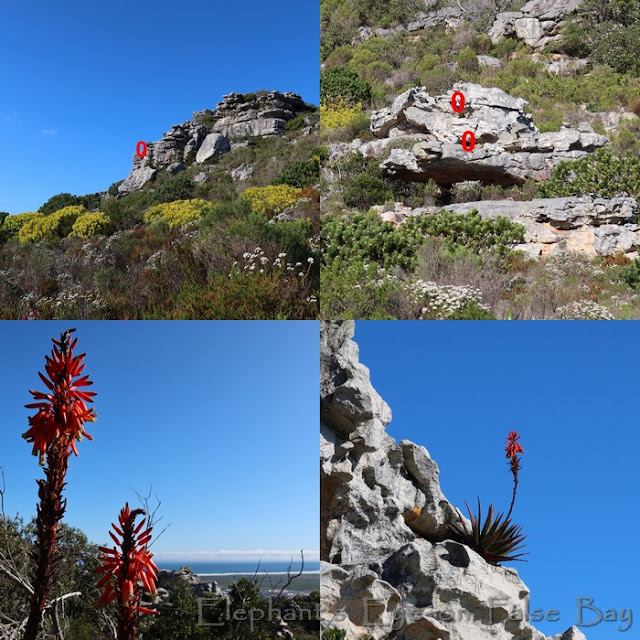 |
| Aloe succotrina at Blackhill in July |
Cape witch orchid Disperis capensis in dark and light colourways. True blue Gladiolus gracilis. Babiana ringens with lime and gold tucked in her heart. Wafting honey along our path Amphithalea ericifolia, mostly in pink, but also a white one.
 |
| Blackhill in July with Cape witch and honey |
Protea repens - suikerbossie - early settlers snapped off the flowers, busy with insects, to harvest the nectar. On the ground green Protea acaulos. Pink puff Stilbe ericoides found only in our South-Western Cape fynbos. Look up and out and across. Pink Erica parviflora, it may be 'parvi' but it is covered in flowers!
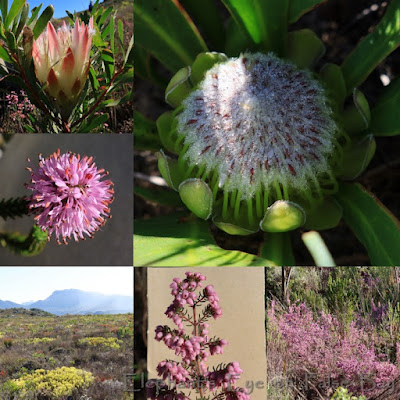 |
| Blackhill proteas and ericas in July |
In Silvermine around Spitzkop. In the seep up the valley Mimetes hirtus. Winter mittens to hold Gladiolus maculatus steady against the breeze. With a rainbow arching over our return as the rain held off for us.
 |
| Mimetes and Gladiolus at Spitzkop in July |
Moraea collina (grows 'on the hill'). In the jeep track Diosma hirsuta. Fluffy with red flowerstalks and anise scented Agathosma lanceolata. Exploding white pompoms Brunia nodiflora. Erica glabella with orangey-red bracts. Curved pink Erica curviflora (grows with Mimetes and wet feet)
 |
| Spitzkop pompoms in July |
That beautiful view of Chapman's Peak was the one Gus chose to RIP.
Longer paler pink bells Erica viscaria, also with shorter darker pink bells. Tiny Muraltia orbicularis (my picture is now on Wikipedia) Yellow daisy Euryops abrotanifolius with her bracts, caterpillar and shining flower beetle.
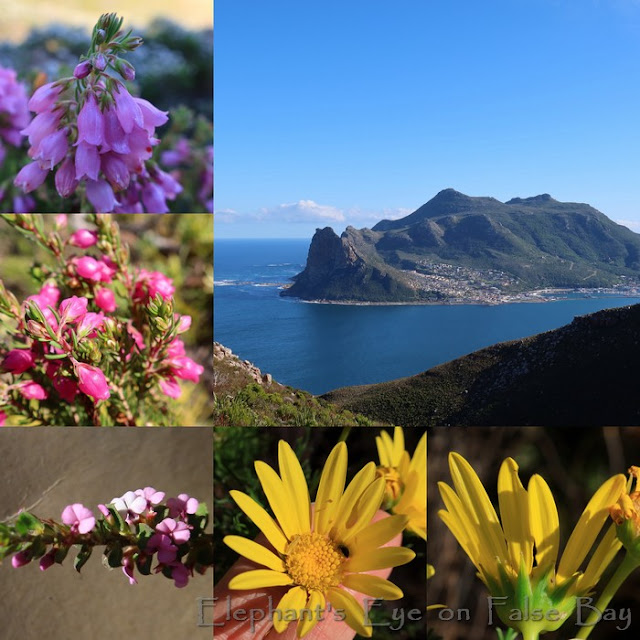 |
| Chapman's Peak flowers in July |
Heliophila scoparia half closed on the way up, and opening on the way down. Adenandra uniflora white with cherry lines and buds. Gnidia pinifolia two overlaid four pointed stars, the central one a tone darker. Shiny fruit on Phylica dioica with a furry topknot. Soft leaves and low growing Metalasia densa.
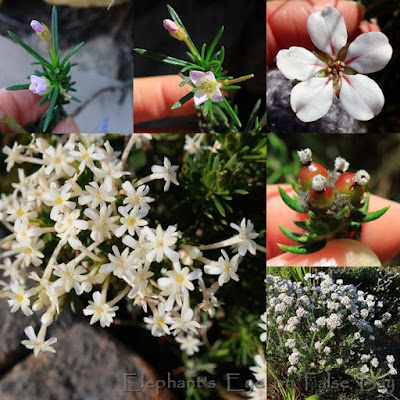 |
| White flowers at Chapman's Peak in July |
On Silvermine Crags I managed to learn - these are our 3 common leucadendrons. 3 species on separate male and female plants, so 6 to learn. Tall with broad leaves Leucadendron laureolum, brown male flowers, then silvery female cone with TINY brown flowers. Tall with narrow leaves Leucadendron xanthoconus female cone in red touched with silver. Low Leucadendron salignum, golden males and flowers, and male plant, then female cone in her multicolours.
 |
| 3 leucadendrons at Silvermine Crags in July |
White across the centre is drifts of Erica lutea, cup and saucer. Dark centred white Erica calycina. Erica caffra likes to grow near water, on the shore of Silvermine Dam. Sturdy trunk supporting masses of white flowers.
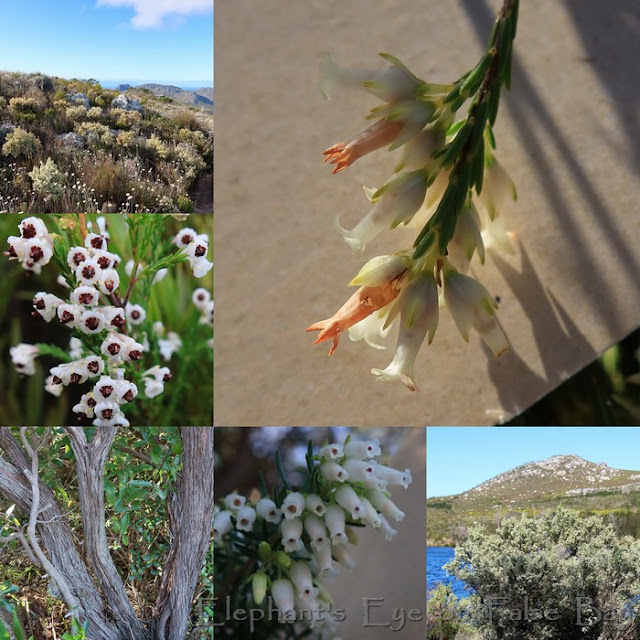 |
| White ericas at Silvermine in July |
Looks like Felicia, but is Zyrphelis taxifolia (the name mangles zephyr) with leaves like yew. Pink furry Erica hirtiflora was a pink haze down the opposite side of the valley. Common and easy to remember is Erica baccans, its rounded pink flowers clustered in neat fours. Tall wind pollinated with masses of minute flowers Erica muscosa.
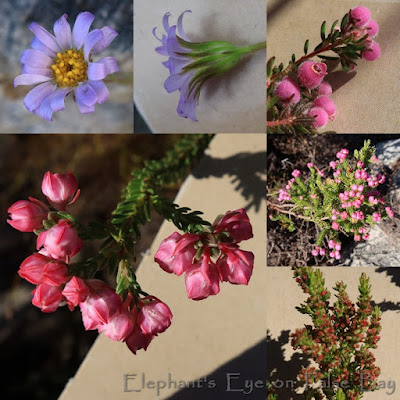 |
| Pink and blue flowers at Silvermine in July |
Our hikes are listed on my page.
I invite you to join us at Elephant's Eye on False Bay. Please subscribe as you prefer
via Feedly,
or my Facebook blog page
Pictures by Diana Studer
of Elephant's Eye on False Bay
Teal blue text is my links.
To read comments if you are in a Reader,
first click thru to the blog)
Thanks for comments that add value. Your comment will not appear until I've read it. I welcome comments on posts from the last 2 months.
Google and Blogger comments uncooperative? Use Name / URL instead.

These hikes must be inspirational for your own native planting schemes - aside from the health aspect, there is such wealth in what you manage to see and photograph. Lots of surprises for me coming from a temperate zone including all those ericas
ReplyDeleteThe Proteas are beautiful. Actually, all the plants and the views are beautiful. I hope to some day get to S. Africa, but short of that, thank you for showing us all the beauty!
ReplyDeleteThe cliff-hanging Aloe is impressive. The blue Gladiolus looks like something that could be found in a glorious fantasy world. As always, the photos of blooms taken during your hikes are awe-inspiring.
ReplyDeleteI was very touched by the story of the man who went to his favourite peaceful place and didn't leave.
ReplyDeleteBeautiful flowers!
ReplyDeleteRegards
Elke
It's so lovely to see all these wildflowers, especially as we are at the end of a summer which has been hotter and drier than usual and there are few wild plants flowering, it's all rather brown and sad. Thank you!
ReplyDeleteBeautiful blog
ReplyDelete